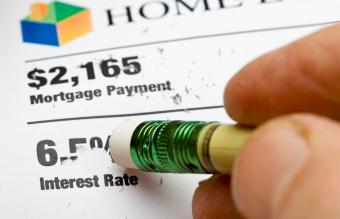
Mortgage points are charges paid to acquire a mortgage loan or to pay off interest on a loan. They come in two forms: discount or origination. Regardless of type, the value of the point is equal to one percent of the mortgage loan. On a $250,000 loan, therefore, a point would be valued at $2,500.
Discount Points
Discount points enable borrowers to pre-pay interest costs and lower the total interest rate applicable to the loan. Because of this, purchasing points reduces the amount of interest the borrower pays over time on their mortgage. Essentially, by purchasing a point, the borrower pays interest before it is due, thereby lowering the amount they pay monthly on the loan. In the previous example, if the borrower purchased one point, they would pay $2,500 in interest on their loan up front and reduce the overall interest rate applicable to the loan by one percent.
The lender determines the number of discount points a borrower can purchase and their cost. Usually, a lender allows a borrower to pay as many as four points. Purchases are usually permitted at the time of closing and anytime afterwards, upon borrower request.
As long as discount points satisfy the IRS criteria described in Tax Topic 504, borrowers may deduct the entire amount of a point as interest on their yearly tax return. Refinanced mortgage points are deductible over the life of the loan and not as interest. Points are not deductible if the house is valued at more than $1 million or there is a home equity debt on the home larger than $1 million.
Origination Points
Origination points are charged by a lender for processing the loan. Essentially, they are fees associated with creating the paperwork and transferring the mortgage funds. They are commonly charged by the lender to cover their costs.
These costs are charged upfront at the time of closing, but are spread over the life of the loan and are not related to interest. Sometimes, points are charged to individuals with poor credit to protect the lender against not earning the full amount of interest they are due for the loan. Essentially, by charging a high-risk borrower points, the lender ensures that they will at least receive some money for their work.
Because they are not interest payments, these points are not deductible. The exception to this is if they are paid to obtain the mortgage and are not paid for closing costs, meaning that they were not charged by the lender to cover their costs.
How Points Affect a Mortgage
Buying discount points lowers the interest rate applicable to the loan. A home mortgage borrower of $250,000 with a six percent interest rate who purchases two points reduces the interest rate to four percent. Without buying points, the borrower would pay $15,000 in interest over the life of the loan. By purchasing the points, he pays just $10,000.
Origination points increase the cost of a loan. A home mortgage of $250,000 carrying two origination points is actually a mortgage of $255,000. Although this increase seems small, consider the fact that those amounts are added to the interest rate charged on the loan. This means that in a 30-year fixed mortgage carrying a six percent interest rate, the borrower pays a total of $20,000 in interest, versus the $15,000 they would if they were not charged points.
Buying origination points, therefore, reduces the overall amount of money they pay, which is not tax deductible. Additionally, it lowers monthly payments and reduces the overall loan balance.
Benefits and Drawbacks of Points
Buying discount points allows borrowers to reduce their monthly payment. Potentially, the borrower could then add more money into their monthly payment and pay off the loan faster. Perhaps the largest benefit to buying a point, however, is the fact that it lowers the interest rate. A lower interest rate means smaller overall loan expenses. However, these points also require cash payment. This means that the borrower will no longer have the money available to invest elsewhere. Prior to buying points, borrowers must analyze how long it will take them to replace the money they spent on their purchase.
Origination points may permit a borrower to acquire a mortgage when he or she otherwise would be unable to do so. Points may, therefore, be necessary. The main drawback to an origination point is that the borrower pays more for their loan. Although the cost is wrapped into their monthly payment and spread over the life of the loan, it is still additional money that the borrower must spend.
Determining if You Should Buy Points
Because of the high value of most financial expert's homes and the fact that they are prohibited by tax laws from deducting points, very few of them discuss whether the average homeowner should purchase points on their mortgage. However, most experts agree that a home is often an individual's largest asset and, as such, should be invested in and paid off early when possible. For example, in a recent interview, Suze Orman encouraged home owners to pay their mortgage off early. Although she does not specifically refer to buying points as a means to do so, she encourages using the method that works best for the homeowner to reduce the number of years that they will pay their mortgage. Financial expert Warren Buffett agrees with this concept.
Whether you should purchase points is a personal decision dependent upon your financial health and the length of time you plan on remaining in your current home. Bank of America offers a mortgage point calculator that provides advice about whether purchasing points is in the borrower's best interest. Although this information is helpful, speak with a professional prior to purchasing points.







